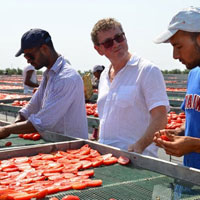By Sue Fleming of TTL
Feedback on our talk at the Elephant & Castle at the end of January often started with ‘this wasn’t what I was expecting, but it is far more interesting & complex than I’d previously thought.’ Fertile ground was laid for more talks exploring some of these issues.
‘How do we create food systems that treat people, animals, and the earth with respect’ was the theme.
Daphne Lambert, nutritionist, chef, environmentalist, was our speaker. She says, every day we make decisions about the food we eat, these choices shape our world and affect all that inhabit the earth. She questions the impact that our diets have on the environment and believes the genuine sustainable response to ‘saving the planet’ through food choice is small, local, ecological farms providing good food and us aligning our diet to the productive capacity of the land
If food, whether meat or plant, is produced in industrial agricultural conditions, the profit motive dominates and the environment as well as animal and human rights issues may be overlooked. The argument that supermarkets demand plentiful supplies of cheap food is masking the true cost to the environment in terms of pollution from pesticides, nitrates, water shortages, soil depletion, biodiversity loss… the list is long and interrelated in a complex way.

One of the good guys – Charles Redfern – organic tomato producer.
Tomatoes were an example of a ‘cheap’ product, readily available to us as processed pasta sauces, tinned tomatoes, passata and puree. The story of the large growers in Italy showed migrant workers in intolerable, impoverished conditions & the environment, already fragile from water shortage, heavily depleted.
Princes & Napolina, both owned by the Mitsubishi Corporation, have been heavily criticised for their supply chain management.
Organico, Suma, Essential & Biona are products we recommend buying.
I won’t go into coconuts and monkeys on chains harvesting them! Almonds grow on over 400,000 hectares in California. 1.5 million colonies of bees are transported across the USA to pollinate the blossoms resulting in massive losses. 80% of the world’s almonds come from this drought ridden state and 5.5 litres of water are needed to grow 1 almond.
Producing milk from nuts was discussed but there’s a lot more information on the Greencuisine website
There was broad consensus that meat eating should be reduced in the developed world or excluded altogether, and Daphne wanted to show that animals, pasture fed in small holdings and reared with integrity, can be part of the cycle of fertility and biodiversity.
I was quite shocked to hear Daphne read the ingredients on the ‘vegan substitute’ for more traditional foods like burgers that had been engineered by food technology. It would be easy to think I was choosing a healthy vegan option, but it sounded far from healthy and more as if the food manufacturers were exploiting a trend.
Interesting ideas came up about eating insects; although more likely to be processed in factory conditions than part of sustainable biodiversity, it might be something to consider for the future.
I personally came away thinking how fortunate we are in Lewes to have local growers & producers farming with integrity. They live on very low incomes to keep their food affordable, which begs the question of how supermarkets & manufacturers of food make such vast profits. Some of the answers to that were there in the talk.
Thank you to Daphne for such an interesting talk. It certainly opens up more questions.




0 Comments